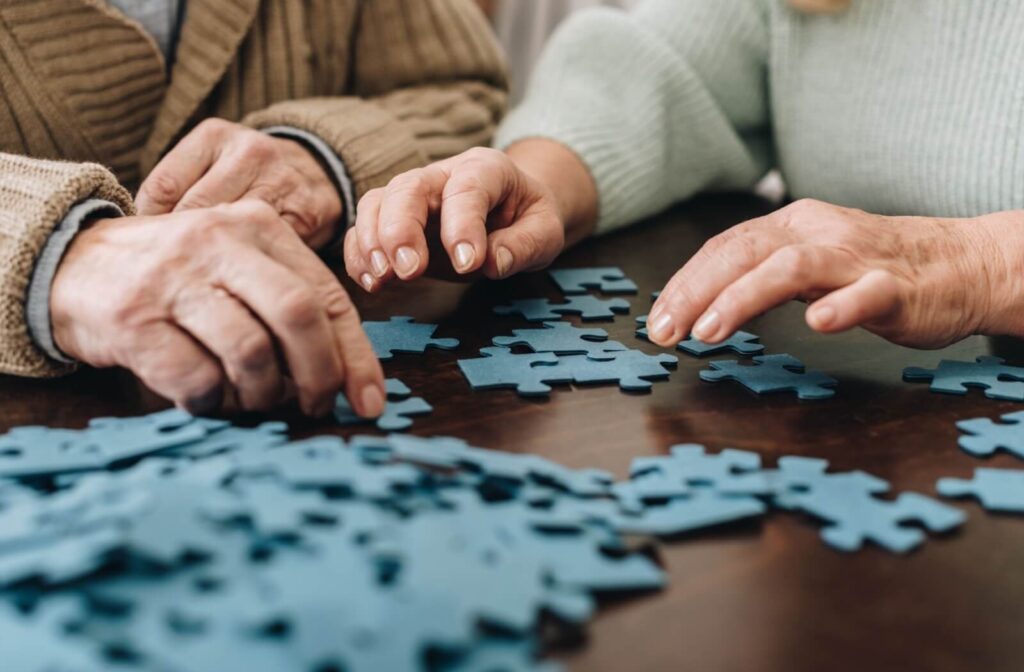Key Takeaways
- Familiar, simple activities can help older adults feel more grounded and emotionally supported.
- Creative expression provides a calm way to explore feelings and maintain a sense of identity.
- Social interaction helps reduce isolation and encourages meaningful connections with others.
- Gentle movement supports physical comfort and can naturally brighten mood throughout the day.
- Sensory-based activities offer comfort through soothing textures, scents, and sounds.
- Music and rhythm can spark recognition, lift spirits, and create moments of joy.
The Role of Daily Activities in Brain Health
Memory changes are complex, and often, they create emotional times for families. Your loved one may develop unusual symptoms that quickly begin affecting their daily life. Fortunately, with the right activities, your loved one can strengthen their mind and reduce the risk of further decline. But how?
Daily activities play a big role in cognitive abilities. Familiar, simple activities can help bring comfort and stability, but they also challenge and strengthen the brain. When your loved one participates in their favorite hobbies or activities, it can help create positive emotional connections and a strong sense of purpose. This serves as a gentle reminder of who they are and what they enjoy.
Memory-Friendly Activities for Cognitive Well-Being
When helping a loved one strengthen their mind, start with their daily activities. Each of these activities challenges the brain in different ways, which is key to preserving memory and cognitive abilities over the years.
Creative Expression
Creative projects give your loved one a relaxed way to stay engaged and express themselves. A simple setup helps them ease into an activity without feeling overwhelmed. Some excellent options for older adults include:
- Painting or drawing with soft colors
- Working with clay or easy craft materials
- Listening to familiar music during creative time
- Sharing short written memories or prompts
These kinds of projects work best when they match your loved one’s comfort level.
Social Connection
Socialization is more important than some people think. It’s closely linked with a healthier body and mind, so even small moments of connection contribute to a healthier life. It helps to try:
- Looking through photo albums together
- Eating meals alongside neighbors or family
- Participating in simple group games
These shared moments help reduce feelings of isolation and strengthen relationships. That’s a great way to improve your loved one’s support network and help them feel more connected.
Light Movement
Gentle movement is one of the best activities to work into a new routine. These help the memory, but they also strengthen your loved one’s body, which can help them live a healthier and more active life. Try encouraging:
- Slow courtyard or garden walks
- Seated stretches or simple balance work
- Gardening with indoor plants or herbs
- Tossing a balloon or a soft ball back and forth
Each of these activities seems simple, but they all offer lifelong benefits.
Sensory-Based Activities
Sensory experiences can bring a sense of familiarity and calm, especially for people who respond well to sound, touch, or scent. Some ideal senior-friendly sensory activities include:
- Holding soft fabrics or textured objects
- Enjoying light scents such as lavender or citrus
- Listening to quiet music or nature sounds
These sensory moments help create a comforting, grounding environment.
Music and Rhythm
Music often connects with long-held memories and can be a source of comfort and joy. Some great music therapy activities for older adults include:
- Singing well-loved songs together
- Tapping gently to an easy rhythm
- Playing familiar music during daily routines
Each option can brighten the atmosphere and help your loved one feel more at ease.

How to Adapt Activities for Your Older Loved One
Adapting activities to your loved one’s preferences is one of the most effective ways to encourage participation. The right adjustments can make familiar tasks feel reassuring and approachable. So, before starting a new activity, make sure you:
- Choose familiar hobbies, tools, or themes
- Break tasks into smaller, simpler steps
- Offer gentle cues instead of instructions
- Keep the space calm and well-lit
- Use short sessions that match energy levels
These small adjustments can make activities feel more natural and supportive.
How a Supportive Community Helps Engagement
A structured community environment helps your loved one participate with confidence. Familiar spaces, regular routines, and steady support make daily engagement easier to enjoy. The right senior living community should offer plenty of convenient activities, services, amenities, and programs to help your loved one every day.
Ideally, a community would offer:
- Predictable daily schedules that feel familiar and easy to follow
- Regular opportunities for social connection
- Comfortable, well-designed spaces that reduce confusion
- A variety of accessible activities tailored to different abilities
- Supportive team members who encourage participation without pressure
The right community should focus on making your loved one’s life easier and more engaging. It should never be about taking something away, but about giving them the support they need.
A Warm Approach to Cognitive Wellness
Meaningful daily engagement can bring comfort to your loved one, offering steady moments of joy and recognition. Whether they’re enjoying music, gentle movement, or creative activities, these experiences help create a supportive rhythm to each day. That’s why our team at Liana of Sarasota has made these activities a part of everyday life.In our community, we offer a warm, encouraging environment where daily engagement and compassionate guidance are part of everyday life. Our team is here to answer your questions and help you find the support that feels right for your family. Book a tour with us today, and come discover our incredible community for yourself.



